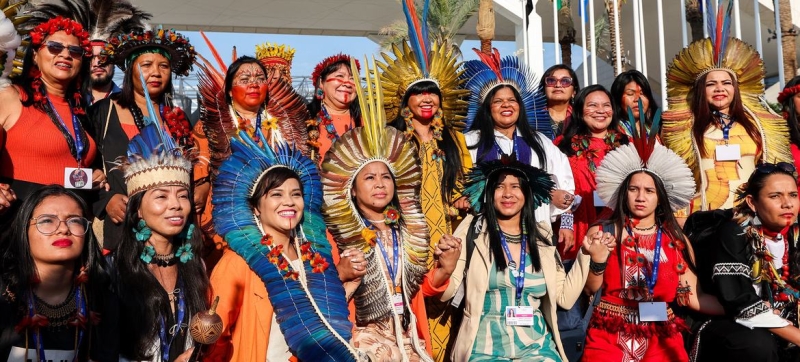
Women from the Brazilian delegation to the UN Climate Conference in Dubai. The Chairman of the General Assembly called for making the declaration of the rights of indigenous peoples a reality Culture and Education
Despite significant achievements in improving the well-being of indigenous peoples, preserving their cultures and increasing participation in the work of the UN, a “deep gap” remains between the commitments made and the reality on the ground. This was stated by the Chairman of the UN General Assembly.
“In these difficult times, when the world is under threat and open exchanges and diplomacy are needed more than ever, let us lead by example in constructive dialogue to fulfill our obligations to indigenous peoples,” Dennis Francis told world leaders and diplomats taking part in the Permanent UN Forum on Indigenous Issues.
The forum’s outcome document expressed support for the implementation of the landmark UN Declaration on the Rights of Indigenous Peoples, adopted in 2007, which sets minimum standards for recognition, protecting and promoting these rights.
Poverty, inequality and abuse
Dennis Francis spoke about the achievements of the UN over the past period, including the adoption of the 2030 Agenda for Sustainable Development and the proclamation of the International Decade of Indigenous Languages.
“Despite these progress, indigenous peoples continue to live in extreme poverty, are more likely to suffer the negative impacts of climate change, are more likely to face dispossession and eviction from ancestral lands, and have unequal access to health care and education compared with other population groups.” – emphasized the President of the General Assembly, adding that indigenous women are three times more likely to experience sexual violence during their lives than women in the world as a whole.
Read also:
Session of the Permanent Forum on Indigenous Issues opened in New York
Ensuring inalienable rights
The head of the UN Department of Economic and Social Affairs, Li Jinhua, noted that the lack of effective participation of indigenous peoples in development processes remains a major obstacle to advancing efforts at the national level. However, with the assistance of the UN, some governments have adopted national action plans and other measures to support the effective implementation of the declaration on the rights of indigenous peoples.
Li Jinhua called on countries to take concrete measures to recognize and ensure the inalienable collective rights of indigenous peoples, including the right to self-determination and autonomy, as well as their historical property and cultural rights.
Ensuring sustainable development
As the 2030 Agenda approaches, the Chairperson of the UN Permanent Forum on Indigenous Issues, Hindu Umaru Ibrahim, stressed the importance of including indigenous peoples’ issues in national reviews of progress towards sustainable development.
“Particular attention needs to be paid to indigenous women and girls, the custodians of traditional ideas about sustainable lifestyles,” she added.
Hindu Umaru Ibrahim also called for the development of initiatives put forward by indigenous peoples, including at the 2013 conference in Norway.
“We advocate the urgent introduction of the position of deputy Secretary-General for Indigenous Affairs,” she said.
